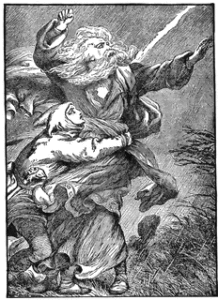
I think that, as a general rule, if you know more about Shakespeare than the average person, chances are that’s also true of a broad number of categories. You’re likely to be good at general knowledge stuff. Which also, if you’re like me, means that people want you for their trivia team. I always hope that Shakespeare questions are going to come up, just to watch the other team throw their hands up in the air in exasperation like ‘Seriously?? He gets a Shakespeare question?!’
If I’m right so far, then is everybody out there playing HQ Trivia yet? It’s the latest mobile app craze (literally, they don’t even have a site for me to link to) that’s gaining in popularity faster than Pokemon Go. The catch is it’s free to play, and you win real money. Got your attention yet?
The app/game’s about as simple as it gets. They play roughly twice a day, at fairly predictable times – 3pm and 9pm in my experience. This is a live streamed game. A video host comes out and talks to you. If you’re not logged on within a couple minutes of the start time, you get to watch but not participate. As one newspaper article commented, “It’s like the next evolution of what used to be called appointment television.” Now instead of being on your couch at 9pm on Tuesday to watch Seinfeld, you’ve got to be on your phone, surrounded by your smart friends.
12 questions, 3 multiple choice answers for each. Get just 1 wrong, you’re out (but then you’ll want to watch the rest of the game to convince yourself that you did in fact know all the other answers). But! There’s a way you can get extra lives to keep playing. More on that in a moment.
Get them all right, you split the prize with other winners. That’s the other catch. The prize, typically $2000, sounds great! But on average over 200 people are going to complete the game and you’re going to get a share somewhere south of $10. When you have over $20 in winnings, you can get a real payout of real money. They’ve also had several special event games where the prize is much higher. I think the New Year’s Eve game was something like $18,000 in prize money.
It’s frustrating as heck, and you’ll spend the entire time saying ‘Why am I doing this?’ but you’ll get hooked just like everybody else. The process is unnecessarily long — did I say the game starts at 3pm? I meant, “You have to fire up the app at 3pm, and then the game starts … and some point in the future, once their algorithm has determined that the number of people joining has leveled off.” So you might wait 5 minutes, or 15. But then, the game st….well, no, not yet. Because here comes the video host to talk to you! It’s a game show. They’re cheesy, it’s what they do. And just like for all game shows he’s going to explain the game as if you never played. But at least it does add some variety to the game, as it is live (so they’ll do things like comment on the chat window) and sometimes surprising – last night, Jimmy Kimmel hosted.
Eventually though you do get to the game, and being as simple as it is, it’s hard to mess up. Question with three answers comes up, click an answer within 10 seconds, get told if you’re right or if you’re eliminated. No special preferences, really only one screen. Basic basic. But oh so addicting.
I haven’t actually had any Shakespeare questions yet, though I did have a Harold Pinter one.
Ok, so! About those extra lives. That’s how they get ya, as the saying goes. It’s a referral program. If you sign up because I convinced you, then you can put in my name (which is, of course, ShakespeareGeek) and I’ll get an extra life – which means, basically, another strike. There’s no collecting them or anything, no choice. If I get a question wrong, but I had an extra life, then I keep playing – and my extra life count goes down. So what I’m hoping is that I’ve intrigued a bunch of you out there to try your trivia brains for a shot at some real money, and you’ll hook a brother up by remembering to add ShakespeareGeek as your referral code. Of course, once you’re up and running, you can share with your own friends and have them use your name. Pay it forward, yo.
How Do I Get It?!
Ok, here’s the links. It’s been out on iTunes for awhile, but only recently showed up for Android. Sometimes it’s a little buggy on both sides, but in general I haven’t had a problem (my kids use iTunes, I use Android, and side by side they’re near identical).
HQ Trivia Android Link
HQ Trivia iTunes Link
That’s it! Get to downloading, remember to add ShakespeareGeek as your referral code, and I’ll see you in the next game!


 complicated to mention I was fast forwarding through King Lear with the kids last night, jumping to the ending. I knew it wouldn’t really capture their attention the way I hoped, and I’d have to explain 90% context, but I’m ok with that :).
complicated to mention I was fast forwarding through King Lear with the kids last night, jumping to the ending. I knew it wouldn’t really capture their attention the way I hoped, and I’d have to explain 90% context, but I’m ok with that :).